- About us»
- Net income calculator»
- Population aging»
-
-
- Unemployment structure in the Visegrad region
- Development in least developed regions
- Detailed statistics of least developed regions in Slovakia
- Statistics of the least developed regions in Slovakia
-
- Average wage
- Material need benefits
- Meal allowance
- Counties of Slovakia
- Inflation
- Living and Subsistence Minimum
- Unemployment of Czechia and Slovakia
- NACE Classification
-
- Life expectancy
- Gender differences
- Youth unemployment and NEET
- Minimum wage in EU
- Unemployment rates of different age groups
- Share of salaries on GDP
- Percentage of employees ususally working at nights
- Unemployment rate
- Employment rate
- NEET
- Long term unemployment
-
- Bratislava and surroundings
- Kopanice
- Danube river
- lower Vah river
- middle Vár river
- upper Nitra river
- lower Nitra river
- Mining cities
- Kysuce a Orava
- upper Vah river - Liptov
- Spiš cities
- upper Hron river
- Juhoslovenská kotlina
- Košice fold and Torysa river
- upper Zemplín
- lower Zemplín
- EU regions
- NUTS3 regions of Slovakia
- LAU1 dataset
-
-
- Projects and activities
- Inclusive growth»
- Good work
- Project SKRS
- Social system – reality and vision
- Library
-
- Education of unemployed
- Young unemployed not taking part in education
- Proposal to change the system of education funding
- News»
- Contact
Germany – DE
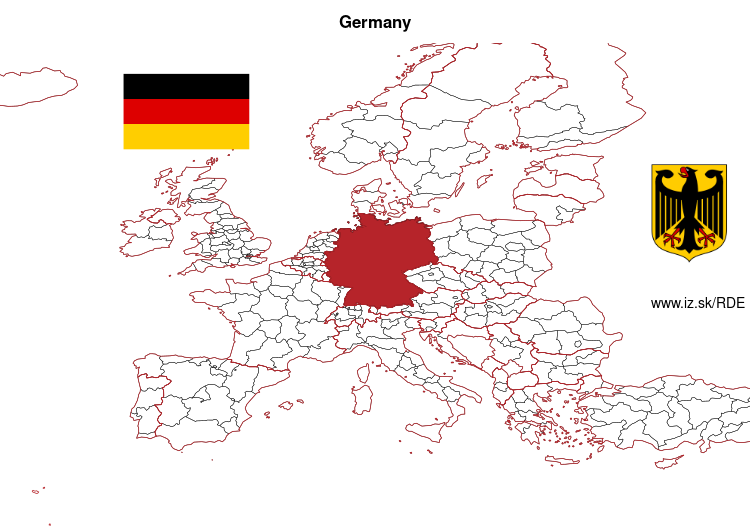
Germany slovensky: DE
Subregions: Baden-Württemberg, Bavaria, Berlin, Brandenburg, Bremen, Hamburg, Hesse, Mecklenburg-Vorpommern, Lower Saxony, North Rhine-Westphalia, Rhineland-Palatinate, Saarland, Saxony, Saxony-Anhalt, Schleswig-Holstein, Thuringia
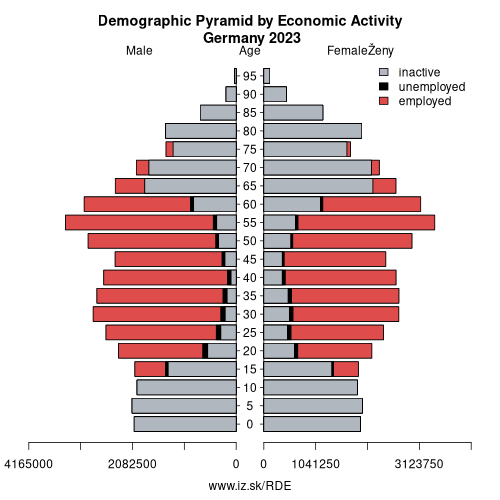
Unemployment
| Indicator | Period | Value |
|---|---|---|
| Unemployment | ||
| unemployment rate | 2024 | 3.5 |
| youth unemployment rate | 2024 | 6.5 |
| unemployment rate of low educated people | 2025q3 | 9 |
| Long term unemployment | ||
| long term unemployment | 2024 | 0.9 |
| share of long term unemployed | 2025q3 | 25.3 |
Composition of population according to age group, education and economic activity, Germany
| Age group | Low education | Middle education | High education |
|---|---|---|---|
| Y20-29 | P: 1813.5 E: 1176.9; U: 136.0; I: 500.6 | P: 5127.9 E: 4003.2; U: 162.1; I: 962.6 | P: 2302.2 E: 1947.0; U: 84.5; I: 270.7 |
| Y30-39 | P: 1741.3 E: 1136.4; U: 99.0; I: 505.9 | P: 4738.2 E: 4117.1; U: 140.6; I: 480.5 | P: 4518.5 E: 4034.9; U: 127.1; I: 356.5 |
| Y40-49 | P: 1724.5 E: 1215.9; U: 79.8; I: 428.8 | P: 4959.3 E: 4439.0; U: 111.3; I: 409.0 | P: 3548.0 E: 3247.4; U: 76.9; I: 223.7 |
| Y50-59 | P: 1869.9 E: 1282.3; U: 56.8; I: 530.8 | P: 6627.5 E: 5672.1; U: 123.5; I: 831.9 | P: 3539.1 E: 3225.4; U: 51.4; I: 262.3 |
| Y60-69 | P: 1806.6 E: 678.8; U: 26.3; I: 1101.5 | P: 6590.1 E: 2927.3; U: 67.5; I: 3595.3 | P: 3340.5 E: 1815.8; U: 41.1; I: 1483.6 |
Note: in thousands in 2024, according to labour force sample survey. P – total population, E – employed, U – unemployed, I – number of economically inactive
Demographics
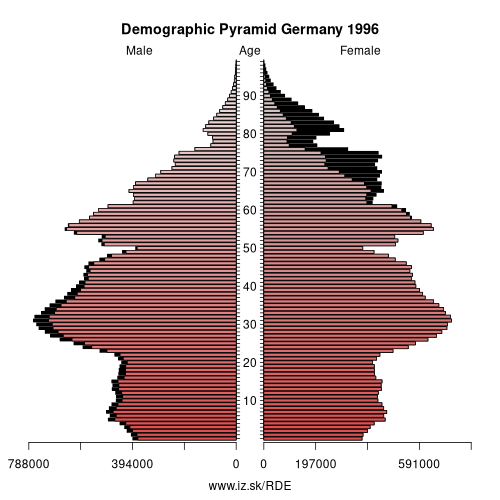
| Indicator | Period | Value |
|---|---|---|
| Demographics | ||
| number of inhabitants | 2025 | 83 577 136 |
| population density | 2023 | 235.8 |
| old-age dependency ratio | 2025 | 35.9 |
| Population ageing | ||
| unemployment rate – over 55 years | 2025q3 | 2.8 |
| aggregate replacement ratio | 2025 | 0.47 |
| aggregate replacement ratio – females | 2025 | 0.52 |
| life expectancy of a 50 year old | 2023 | 32.5 |
| healty life expectancy at 50 years | 2023 | 17.9 |
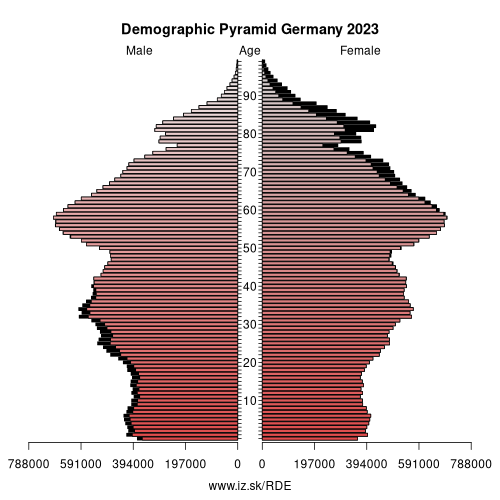
Employment by sectors, Germany
| NACE r2 | % | NACE r2 | % | ||
|---|---|---|---|---|---|
| A | 481.6 | 1% | B-E | 8537.4 | 20% |
| F | 2710.3 | 6% | G-I | 8978.3 | 21% |
| J | 1739.8 | 4% | K | 1311.4 | 3% |
| L | 397.4 | 1% | M_N | 4326.4 | 10% |
| O-Q | 12 207 | 29% | R-U | 2012.7 | 5% |
| TOTAL | 42 703 | 100% |
Data for the period year 2024. Source of the data is Eurostat, table [lfst_r_lfe2en2].
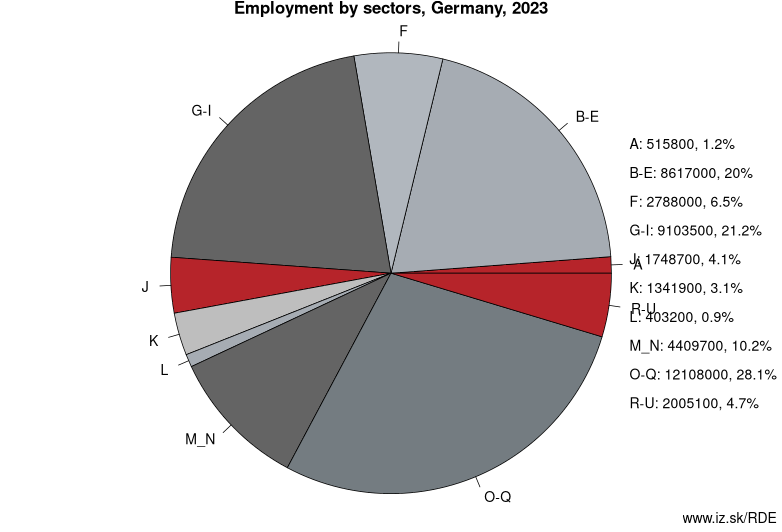
From Wikipedia :
Germany (German: Deutschland, German pronunciation: [ˈdɔʏtʃlant]), officially the Federal Republic of Germany (German: Bundesrepublik Deutschland, listen ), is a country in Central and Western Europe, lying between the Baltic and North Seas to the north and the Alps, Lake Constance and the High Rhine to the south. It borders Denmark to the north, Poland and the Czech Republic to the east, Austria and Switzerland to the south, France to the southwest, and Luxembourg, Belgium and the Netherlands to the west.Germany includes 16 constituent states, covers an area of 357,386 square kilometres (137,988 sq mi), and has a largely temperate seasonal climate. With 83 million inhabitants, it is the second most populous state of Europe after Russia, the most populous state lying entirely in Europe, as well as the most populous member state of the European Union. Germany is a very decentralised country. Its capital and largest metropolis is Berlin, while Frankfurt serves as its financial capital and has the country's busiest airport. Germany's largest urban area is the Ruhr, with its main centres of Dortmund and Essen. The country's other major cities are Hamburg, Munich, Cologne, Stuttgart, Düsseldorf, Leipzig, Bremen, Dresden, Hanover, and Nuremberg.
Various Germanic tribes have inhabited the northern parts of modern Germany since classical antiquity. A region named Germania was documented before AD 100.
Neighbours: Netherlands, Poland, Denmark, Austria, Czech Republic, Switzerland, Belgium, France, Luxembourg
Subregions: Baden-Württemberg, Bavaria, Berlin, Brandenburg, Bremen, Hamburg, Hesse, Mecklenburg-Vorpommern, Lower Saxony, North Rhine-Westphalia, Rhineland-Palatinate, Saarland, Saxony, Saxony-Anhalt, Schleswig-Holstein, Thuringia
Suggested citation: Michal Páleník: Europe and its regions in numbers - Germany – DE, IZ Bratislava, retrieved from: https://www.iz.sk/PDE, ISBN: 978-80-970204-9-1, DOI:10.5281/zenodo.10200164

 Share
Share Facebook
Facebook Twitter
Twitter News
News